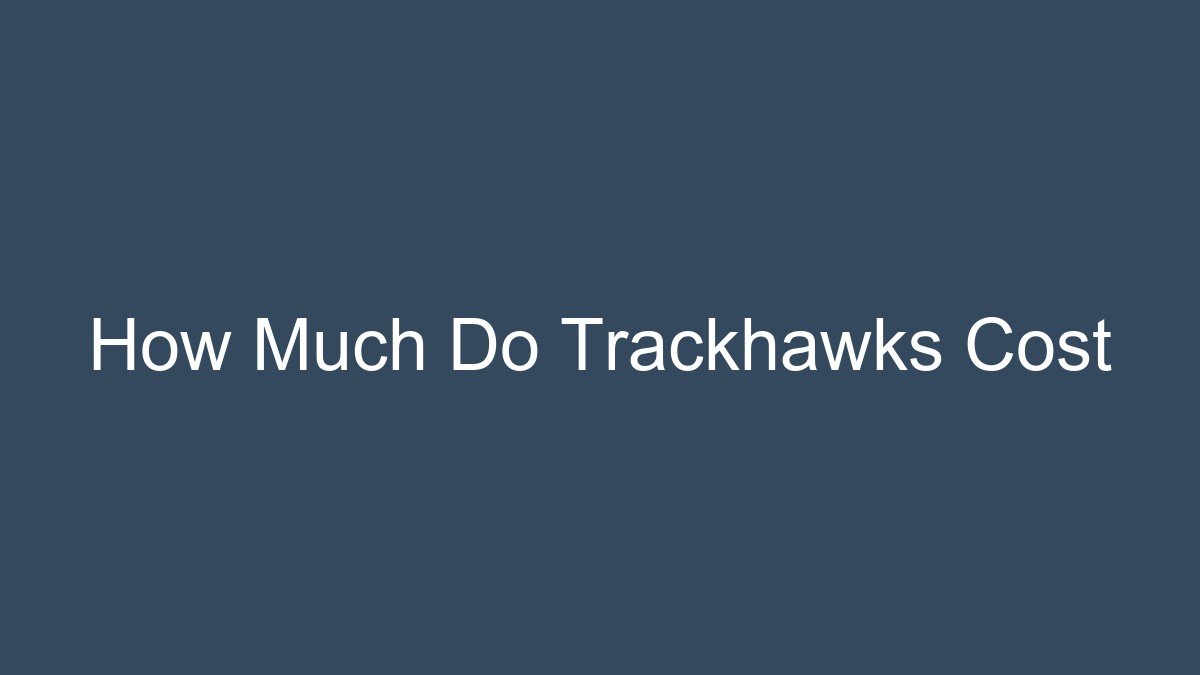
Contents
- Unveiling the Beast: How Much Do Trackhawks Really Cost? Your Ultimate Buyer’s Guide
- The Price Tag: New vs. Used Trackhawk Costs
- Beyond the Sticker Price: Understanding Total Trackhawk Ownership Costs
- Factors That Influence a Trackhawk’s Price
- How to Find the Best Deal on Your Trackhawk: Step-by-Step
- Smart Tips for Buying Your Trackhawk
- Common Mistakes to Avoid When Buying a Trackhawk
- Conclusion: Tame the Beast Responsibly
- FAQ
Unveiling the Beast: How Much Do Trackhawks Really Cost? Your Ultimate Buyer’s Guide
The Jeep Grand Cherokee Trackhawk. Just the name conjures images of raw power, a supercharged symphony, and head-snapping acceleration. It’s a true performance SUV that defies expectations, stuffing a Hellcat engine into a family-friendly package. If you’ve been dreaming of owning one of these incredible machines, you’re probably asking the million-dollar (or, well, six-figure) question: “How much does a Trackhawk cost?”
The answer isn’t as simple as a single number. The price of a Trackhawk involves much more than just the initial purchase. In this detailed guide, we’ll break down everything you need to know about Trackhawk costs, from initial sticker price to ongoing ownership expenses, ensuring you’re fully prepared to tame this beast.
The Price Tag: New vs. Used Trackhawk Costs
Let’s start with the big one: the actual purchase price. Since the Trackhawk’s production run concluded, finding a brand-new one is incredibly rare, if not impossible. Most buyers will be looking at the used market.
🛒 Recommended Product
When New: The Original MSRP (For Reference)
When it was originally available, the Jeep Grand Cherokee Trackhawk commanded a premium price befitting its performance.
* The MSRP (Manufacturer’s Suggested Retail Price) for a new Trackhawk typically started in the high $80,000s to low $90,000s.
* However, with various optional packages and features like a panoramic sunroof, premium audio system, specific wheel designs, and interior upgrades, the price could easily climb well over $100,000.
Remember, these figures are largely for historical context now. If you somehow stumble upon a “new” Trackhawk (perhaps one that sat unsold for years), expect it to still command a price close to its original MSRP, or even above, due to its rarity and collector status.
The Real World: Used Trackhawk Prices
For most aspiring Trackhawk owners, the used market is where the hunt begins. This is where the pricing becomes more variable.
* Used Trackhawk prices can range significantly, typically from the low $60,000s for earlier models with higher mileage to well over $90,000 for newer, low-mileage, pristine examples.
Several factors play a crucial role in determining the used price:
- Model Year: Newer model years (e.g., 2020 or 2021) will generally be more expensive than older ones (e.g., 2018 or 2019).
- Mileage: This is a huge factor. A Trackhawk with low mileage (under 30,000 miles) will command a much higher price than one with significantly more miles.
- Condition: The overall physical and mechanical condition of the vehicle is paramount. A well-maintained, accident-free Trackhawk with a clean title will always fetch more.
- Options and Packages: Original options like upgraded brakes, special paint, or advanced technology packages can add to the resale value.
- Location: Market demand can vary by region. A Trackhawk might be priced differently in a high-demand area versus a slower market.
- Market Demand: Trackhawks hold their value relatively well due to their limited production and cult following, but market conditions can still cause fluctuations.
Key Takeaway: While Trackhawks experience depreciation like any other vehicle, their unique status helps them retain value better than many other high-performance SUVs. Expect to pay a premium for a well-maintained, lower-mileage example.
Beyond the Sticker Price: Understanding Total Trackhawk Ownership Costs
The purchase price is just the entry fee. To truly understand “How much do Trackhawks cost?”, you need to factor in the ongoing expenses that come with owning such a high-performance machine. Ignoring these can lead to significant financial surprises.
1. Insurance Costs
This is where the rubber meets the road (literally and figuratively). Insuring a Trackhawk is not cheap.
* Why it’s expensive: It’s a high-performance vehicle with a powerful engine, a high sticker price, and a statistically higher likelihood of being driven spiritedly (which can increase accident risk).
* What to expect: Your insurance premiums will vary based on your age, driving record, location, chosen coverage, and even where you park the car. However, prepare for annual premiums that could range from $2,000 to well over $4,000 or more.
* Tip: Always get multiple insurance quotes before you buy the car. This gives you a clear picture of this significant ongoing expense.
2. Fuel Costs
Let’s be blunt: the Trackhawk is a thirsty beast. Its supercharged 6.2-liter V8 engine is designed for power, not fuel efficiency.
* Fuel Type: It requires premium octane fuel (91+ RON).
* MPG: Expect fuel economy in the low teens (around 11-13 MPG combined). If you enjoy unleashing its full potential, that number will drop even lower.
* What it means for your wallet: Depending on fuel prices and how much you drive, your monthly fuel bill could easily be hundreds of dollars.
3. Maintenance and Service
High-performance vehicles demand high-performance maintenance.
* Routine Maintenance: Oil changes, tire rotations, and fluid checks will be more expensive than on a standard SUV. Specialized parts and labor rates apply.
* Specific Trackhawk Needs: The supercharger, high-performance braking system, and specialized drivetrain components require specific attention and expertise. Always seek out qualified technicians who are familiar with SRT and Hellcat engines.
* Major Services: Expect potentially significant costs for larger service intervals, especially as the vehicle ages.
4. Tire Replacement
Those wide, sticky performance tires are crucial for putting all that power to the pavement, but they come at a cost.
* Tire Type: Trackhawks come with high-performance summer tires, which are expensive.
* Wear: Due to the vehicle’s weight and power, these tires can wear out relatively quickly, especially if you drive aggressively.
* Cost: A full set of replacement tires can easily cost $1,200 to $2,000 or more, and you might need them every 15,000-30,000 miles, depending on your driving style.
5. Taxes, Registration, and Fees
Don’t forget the government’s cut!
* Sales Tax: Varies by state, often 5-10% of the purchase price.
* Registration Fees: Annual fees based on the vehicle’s value, weight, or age in your state.
* Documentation Fees: Dealership fees for processing paperwork.
* Luxury Taxes: Some states may have additional taxes for high-value vehicles.
🛒 Recommended Product
Recap: The total cost of ownership for a Trackhawk can easily be $5,000 to $10,000+ annually beyond your car payment, depending on your driving habits and location. Budget accordingly!
Factors That Influence a Trackhawk’s Price
When you’re searching, keep these factors in mind as they directly impact the price you’ll pay:
- Year of Manufacture: Newer models (2020-2021) generally command higher prices than older ones (2018-2019).
- Mileage: Lower mileage equals higher price. This is one of the most significant determinants of value on the used market.
- Condition: Pristine condition, inside and out, with a clean service history, will fetch a premium. Accidents, dings, or mechanical issues will significantly lower the price.
- Optional Equipment: Original options like a panoramic sunroof, premium Harman Kardon sound system, red seatbelts, or specific wheel packages can add to the resale value.
- Vehicle History Report: A clean CarFax or AutoCheck report with no accidents and consistent service records is highly desirable and adds value.
- Geographic Location: Prices can fluctuate based on regional demand and availability.
- Seller Type: Private sellers might offer slightly lower prices than dealerships, but dealerships often provide financing options, potential warranties, and a more streamlined purchasing process.
How to Find the Best Deal on Your Trackhawk: Step-by-Step
Finding the right Trackhawk at the right price requires diligence. Here’s a step-by-step approach:
-
Step 1: Define Your Budget (and Stick to It!)
- Be realistic about your total budget, including the purchase price, taxes, and initial ownership costs (insurance, first tank of fuel).
- Crucially, factor in those ongoing ownership costs. Can you comfortably afford the fuel, insurance, and maintenance?
-
Step 2: Research Current Market Values
- Utilize online automotive marketplaces and pricing guides to see what similar Trackhawks are selling for in your area and nationally.
- Filter by year, mileage, and condition to get a realistic range. This will empower you during negotiation.
-
Step 3: Get Pre-Approved for Financing
- Before you even step foot in a dealership or contact a private seller, know your buying power. Get pre-approved for a loan from your bank or credit union.
- This gives you a clear maximum you can spend and provides leverage during negotiations, as you’re a ready buyer.
-
Step 4: Shop Around Extensively
- Don’t jump on the first Trackhawk you see. Expand your search to multiple dealerships and private sellers. Be willing to travel a reasonable distance for the right vehicle.
- Compare prices, conditions, and vehicle history reports.
-
Step 5: Demand a Pre-Purchase Inspection (PPI)
- This is NON-NEGOTIABLE for a high-performance used vehicle like a Trackhawk. Pay a trusted, independent mechanic (preferably one specializing in performance vehicles or SRT models) to thoroughly inspect the car before you buy it.
- A PPI can uncover hidden issues, saving you thousands in future repairs. It’s a small investment for peace of mind.
-
Step 6: Negotiate Wisely
- Armed with your research, pre-approval, and PPI results, be prepared to negotiate.
- Don’t be afraid to walk away if the deal isn’t right. There will always be another Trackhawk.
Smart Tips for Buying Your Trackhawk
- Be Patient: The perfect Trackhawk at the perfect price might not appear overnight.
- Read the Vehicle History Report: Always get a CarFax or AutoCheck report. Look for consistent service records, no accident history, and clear title status.
- Test Drive Thoroughly: Don’t just drive it around the block. Take it on highways, over varying road conditions, and pay attention to any unusual noises, vibrations, or handling characteristics.
- Factor in Ongoing Costs: We can’t stress this enough. The purchase price is only part of the equation.
- Consider a Certified Pre-Owned (CPO) if available: While rare for Trackhawks, if you find one, a CPO vehicle often comes with an extended warranty and rigorous inspection, offering added peace of mind.
Common Mistakes to Avoid When Buying a Trackhawk
- Ignoring the Total Cost of Ownership: The biggest mistake! Focusing only on the monthly payment or purchase price and forgetting about insurance, fuel, and maintenance can quickly turn your dream into a financial nightmare.
- Skipping the Pre-Purchase Inspection (PPI): A PPI is your safeguard against buying someone else’s expensive problems. Don’t cheap out on this critical step.
- Falling in Love Too Quickly: The allure of the Trackhawk is powerful, but don’t let emotion override your logic. Stick to your budget and follow your checklist.
- Not Researching Financing Options: Accepting the first loan offer from a dealership without comparing rates can cost you thousands over the life of the loan.
- Overlooking the Vehicle History: An accident or poor maintenance history can severely impact the car’s reliability and future resale value.
Conclusion: Tame the Beast Responsibly
The Jeep Grand Cherokee Trackhawk is an extraordinary vehicle, offering an unparalleled blend of SUV practicality and supercar performance. Understanding “How much do Trackhawks cost?” means looking beyond the initial purchase price and embracing the full spectrum of ownership expenses.
🛒 Recommended Product
By doing your homework, budgeting wisely, and being thorough in your inspection and negotiation, you can make an informed decision and enjoy the exhilarating experience of owning one of the most powerful SUVs ever built. Drive safe, and prepare for an adrenaline rush every time you press the pedal!
FAQ
Q. What was the original Manufacturer’s Suggested Retail Price (MSRP) for a new Jeep Grand Cherokee Trackhawk?
A. When new, the Jeep Grand Cherokee Trackhawk typically had an MSRP starting around \$87,000 to \$90,000. However, with popular options and packages, the final sticker price could easily push well into the low to mid-\$90,000s, and even approach or slightly exceed \$100,000 for fully loaded models.
Q. How much does a used Jeep Grand Cherokee Trackhawk typically cost today?
A. The cost of a used Trackhawk varies significantly based on year, mileage, condition, and optional features. Generally, you can expect to find used Trackhawks ranging from the mid-\$50,000s for earlier models with higher mileage to the high-\$70,000s or even low-\$80,000s for more recent model years (like 2020-2021) with lower mileage and excellent condition. Extremely low mileage, pristine examples can still command prices in the mid-\$80,000s.
Q. What factors significantly influence the price of a used Trackhawk?
A. Several key factors impact a used Trackhawk’s price:
1. Model Year: Newer models (e.g., 2020-2021) are generally more expensive than older ones (e.g., 2018).
2. Mileage: Lower mileage vehicles command higher prices. The 707 horsepower engine is often associated with spirited driving, so lower miles often indicate less wear.
3. Condition: The overall physical and mechanical condition, including accident history, service records, and interior/exterior wear, plays a huge role.
4. Options/Packages: Factory-installed options like the panoramic sunroof, upgraded sound system, Brembo brakes, and specific wheel packages can add value.
5. Aftermarket Modifications: While some tasteful modifications might be seen as an upgrade, extensive or poorly installed aftermarket parts can sometimes deter buyers or decrease value.
6. Location: Regional demand and inventory can also cause price fluctuations.
Q. How has the Trackhawk’s value depreciated over time?
A. Like most high-performance vehicles, the Trackhawk experienced significant initial depreciation from its original MSRP. After the first 3-5 years, the steepest drop typically occurs. However, its unique status as the most powerful SUV ever produced by Jeep, combined with its limited production run, means its depreciation curve has leveled off more favorably than some other performance SUVs. While it’s still losing value, the rate has slowed, and it’s unlikely to drop into the budget performance category anytime soon.
Q. Are there any additional costs to consider beyond the purchase price of a Trackhawk?
A. Absolutely. Owning a Trackhawk comes with several significant ongoing costs:
1. Fuel: The supercharged 6.2L V8 is notoriously thirsty, requiring premium fuel and achieving relatively low MPG figures (often single digits in city driving).
2. Insurance: Due to its high performance and cost, insurance premiums are typically very high.
3. Maintenance: Performance vehicles often have higher maintenance costs, including more frequent oil changes, brake services (especially for the large Brembo brakes), and specialized components.
4. Tires: The high horsepower and torque can wear through tires quickly, and performance tires for the Trackhawk’s large wheels are expensive.
5. Registration/Taxes: Depending on your location, annual registration fees and sales tax on purchase can be substantial.
Q. Is the Trackhawk likely to hold its value well in the future, or become a collector’s item?
A. The Trackhawk has a strong potential to hold its value relatively well compared to many other SUVs, and it may even appreciate slightly for pristine, low-mileage examples over the long term. Its status as the most powerful production SUV from Jeep, the use of the Hellcat engine, and its limited production (especially post-2021 as it was discontinued) contribute to its collectibility. While not every Trackhawk will become a prized classic, well-maintained examples are likely to be sought after by enthusiasts for years to come.
Q. What is the typical price range between the cheapest and most expensive Trackhawks currently on the market?
A. The practical range you’ll see in the current used market usually spans from approximately \$50,000 on the lower end for an older model (2018), potentially with higher mileage (60,000+ miles), or a less desirable history, up to around \$85,000 to \$90,000 for the newest model years (2020-2021) with very low mileage (under 15,000 miles), pristine condition, and desirable options. Anything significantly below \$50,000 might indicate major issues, while prices above \$90,000 are rare and typically reserved for showroom-condition, ultra-low mileage, or highly specialized examples.
Related Articles
How Much Is a Corvette
How Much Does a Corvette Cost? Your Ultimate Guide to Unlocking the Dream Ah, the Corvette. Just uttering the name conjures images of sleek lines, exh…
How Much Is a Grand Wagoneer
How Much Is a Grand Wagoneer? Your Complete Guide to Understanding the Price Tag The Grand Wagoneer. Just the name conjures images of luxurious comfor…
How Much Is a Mclaren 720s
How Much Is a McLaren 720S? Your Ultimate Guide to Understanding the Price Tag The McLaren 720S. Just the name conjures images of blistering speed, ae…
Affiliate Disclosure: As an Amazon Associate, I earn from qualifying purchases made through links on this site.















